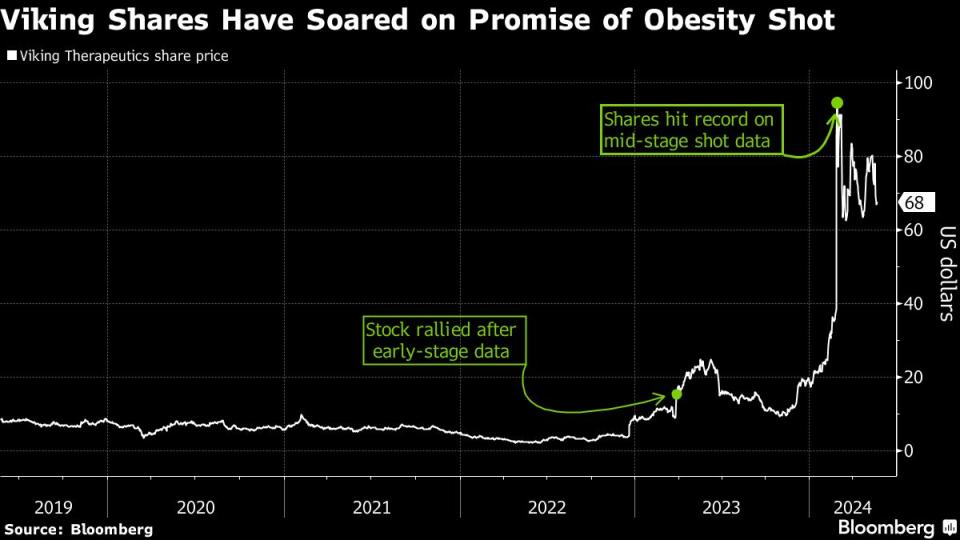Weight-Loss Upstart Viking Needs a Deal to Vie With Lilly and Novo

(Bloomberg) -- Hope for a weight-loss drug that’s better than Ozempic and Wegovy has sent Viking Therapeutics Inc. shares skyrocketing. But to reach the next level the biopharmaceutical developer likely needs a partner — or a buyer.
Most Read from Bloomberg
One Dead After Singapore Air Flight Hit By Severe Turbulence
Citi Trader Got 711 Warning Messages Before Sparking Flash Crash
‘It Felt Like We Had Crashed’: Singapore Air Passenger Describes Turbulence Terror
Viking’s shares have more than tripled this year, briefly reaching a nearly $10 billion market valuation. Fueling the stock’s climb were results from a mid-stage trial of the biotech’s experimental weight loss shot as well an early look at a pill formulation that could eventually compete with the top-selling medicines from Eli Lilly & Co. and Novo Nordisk A/S.
Wall Street is upbeat on the chances of approval for Viking’s therapy, but, manufacturing and selling such a medicine promises to be a challenge for the small-cap contender. So far even the established drugmakers have struggled to meet demand — allowing compounding pharmacies to make cheaper copycat versions in the interim.
Read more: Hims Debuts $199 Weight-Loss Shots at 85% Discount to Wegovy
“As a small biotech company, the typical route for commercialization is they partner with others or they sell the company,” said Roger Song, an analyst at Jefferies. The likelihood of a deal “is even higher just because obesity is such a big market, it’s almost impossible for a small company to commercialize in that market.”
Before Lilly’s Zepbound and Novo’s Wegovy arrived on the scene, new weight-loss drugs from small-scale biotechs struggled commercially or worse. Today, Viking is racing alongside a slew of developers — including heavyweights like Amgen Inc., Regeneron Pharmaceuticals Inc. and Roche Holding AG — to replicate the recent blockbusters’ success.
But both Lilly and Novo had to invest heavily to boost the supply of their treatments in order to meet rising demand, with the Danish drugmaker pouring about $11 billion into three manufacturing facilities. In contrast, La Jolla, California-based Viking had less than $1 billion in cash on hand at the end of March.
If Viking were to decide to power through and commercialize a drug themselves, they’ll need to collaborate with a drug-product manufacturer and a distributor, according to Jared Holz, a health-care specialist at Mizuho.
“But, they’re going to have to raise money in perpetuity,” Holz said. “It’s too expensive of a business. I don’t know how a small cap biotech can possibly compete.”
Costly Venture
The magnitude of investment needed to take on Novo and Lilly stands to be a deterrent to finding a big drugmaker willing to take a gamble on Viking.
“It’s going to be a very expensive proposition for anyone acquiring Viking,” said Holz. “As a buyer, you better be sure that the math is going to work on the deal because Lilly and Novo already have these existing businesses. Whoever comes into this market in large-cap pharma is going to be so far behind.”
But with many pharmaceutical giants facing a looming patent cliff and looking to plug revenue and manufacturing holes, Wall Street views the odds of Viking getting acquired as high.
Pfizer Inc., Merck & Co., Amgen and AstraZeneca Plc are at the top of analysts’ list of potential buyers for the nine-year-old company.
Viking won’t come cheap, according to Rahul Jasuja, head of biopharma research at Visible Alpha, but an “expensive buyout here may be justified because you got to be a player in this large field — or else you never get to be a player.”
“The plan for Viking would be to find a partner before it begins phase three because for it to raise that kind of money for a phase three is very expensive,” Jasuja added, referring to the final stage of drug development. “That’s the timeline that partnerships begin to crystallize.”
Viking declined to comment on its business development activities but said it is open to considering any opportunity that is presented.
Waiting Game
“This looks exactly like the ideal scenario to increase shareholder value for both Viking shareholders and the acquiring shareholders through an M&A transaction,” said Jay Olson, an analyst at Oppenheimer.
Olson sees Viking getting acquired at around a 115% premium to the previous close, in-line with his target price of $138 per share — the highest on Wall Street. The stock could demand an even higher price if there is more than one bidder, he added.
Still, less than half of all biopharma acquisitions happen while assets are in the earlier stages of testing, according to IQVIA compiled data. Instead, the bulk of biotech deals typically occur when medicines are in the final leg of their journey — typically large placebo-controlled trials — or with regulatory approval already in place.
Here Are the Obesity Drug Hopefuls Vying to Unseat Lilly, Novo
For now, investors are watching for more details from the mid-stage trial of Viking’s weight-loss shot. Additional data is expected to be presented at a medical conference later this year.
“We’re talking about a drug that’s going to be approved years from now,” said Olson. “So there’s plenty of time to figure it out.”
Most Read from Bloomberg Businessweek
A Hidden Variable in the Presidential Race: Fears of ‘Trump Forever’
Millennium Covets Citadel-Size Commodities Gains, Just Not the Risk
©2024 Bloomberg L.P.

 Yahoo Finance
Yahoo Finance 